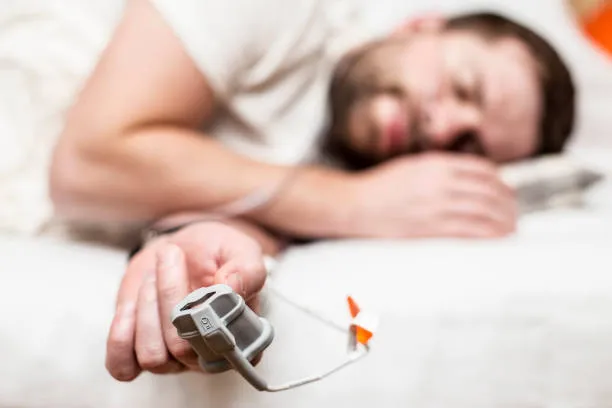Understanding Sleep Apnea: What It Is and How to Treat It

Do you ever wake up exhausted after a full night’s sleep? You might be surprised to learn that millions of Australians experience this issue. The culprit could be a sleep disorder called sleep apnea.
Sleep apnea disrupts your breathing throughout the night, leading to fragmented sleep and a lack of oxygen. While it might sound scary, sleep apnea is a highly treatable condition. This article will explore sleep apnea, its causes and symptoms, diagnosis methods like home sleep apnea tests, and the various treatment options.
Contents
What is Sleep Apnea?
Sleep apnea is a chronic sleep disorder characterised by brief pauses in breathing during sleep. These pauses can occur hundreds of times a night, each lasting anywhere from a few seconds to a whole minute.
There are three main types of sleep apnea:
- Obstructive sleep apnea (OSA) is the most common type, occurring when the throat muscles relax and block the airway during sleep.
- Central sleep apnea is a less common type where the brain fails to send signals to the muscles that control breathing.
- Mixed sleep apnea is a combination of obstructive and central sleep apnea.
Signs and Symptoms of Sleep Apnea
Sleep apnea can manifest in various ways, and some people might not even realise they have it. Here are some common signs and symptoms:
- Loud snoring: This is a classic symptom of sleep apnea, but not everyone who snores has it.
- Excessive daytime sleepiness (EDS): Feeling tired and sluggish throughout the day, even after a good night’s sleep.
- Witnessed apneas: Someone else noticed that you stopped breathing briefly during sleep.
- Morning headaches: Waking up with a headache can indicate sleep apnea.
- Restless sleep: You might wake up frequently at night without realising it.
- Difficulty concentrating: Sleep deprivation due to apnea can affect your focus and concentration.
- Mood swings: Irritability and mood changes can be linked to sleep apnea.
- Waking up gasping for air: This can happen during an apnea event.
- High blood pressure: Untreated sleep apnea can increase your risk of high blood pressure.
Risk Factors for Sleep Apnea
Several factors can increase your risk of developing sleep apnea:
- Being overweight or obese: Excess weight can strain your throat muscles, making them more likely to collapse during sleep.
- Neck circumference: Having a larger neck circumference can narrow your airway.
- Age: Sleep apnea is more common in older adults but can affect people of all ages.
- Family history: If you have a family member with sleep apnea, you’re more likely to develop it yourself.
- Nasal congestion: A stuffy nose can worsen sleep apnea symptoms.
- Smoking: Smoking can irritate the airways and worsen sleep apnea.
- Large tonsils or adenoids: Enlarged tonsils or adenoids can obstruct the airway during sleep, particularly in children.
How is Sleep Apnea Diagnosed?
If you suspect you might have sleep apnea, it’s crucial to see your doctor for a proper diagnosis. They will ask about your sleep habits, symptoms, and medical history. They might also perform a physical examination to check your neck circumference and airway.
Here are some diagnostic tools used for sleep apnea:
- Polysomnography: This is the gold standard for sleep apnea diagnosis. It involves spending a night at a sleep lab where your brain waves, breathing patterns, oxygen levels, and muscle activity are monitored.
- Home Sleep Apnea Tests (HSATs): These are portable monitors you can use at home to record your sleep data. HSATs are a convenient and less expensive alternative to polysomnography, but they might not be suitable for everyone.
Treatment Options for Sleep Apnea
The good news is that sleep apnea is highly treatable. Depending on the severity of your condition, your doctor might recommend one or a combination of the following treatments:
- Continuous positive airway pressure (CPAP) therapy is the most common treatment for sleep apnea. A CPAP machine uses a mask to deliver constant air pressure to keep your airway open during sleep.
- Auto-CPAP therapy: This is a variation of CPAP therapy where the machine automatically adjusts the air pressure throughout the night.
- Bi-level positive airway pressure (BiPAP) therapy: This therapy uses two different air pressure levels for inhalation and exhalation, which can be helpful for people who have difficulty tolerating CPAP therapy.
- Oral appliance therapy involves wearing a custom-made mouthpiece that helps keep your airway open during sleep. This is typically used for mild to moderate OSA and requires regular dental check-ups to ensure proper fit.
- Lifestyle changes: Losing weight, quitting smoking, and avoiding alcohol before bed can all improve sleep apnea symptoms.
- Surgery: In some cases, surgery might be an option to remove tissue or reshape the airway. However, surgery is usually considered a last resort due to potential complications.
Living With Sleep Apnea
If you’ve been diagnosed with sleep apnea, there are steps you can take to manage your condition and improve your sleep quality:
- Use your CPAP or other prescribed treatment consistently: Sticking with your treatment plan is essential for managing sleep apnea and its associated health risks.
- Maintain a healthy weight: Losing weight can significantly improve sleep apnea symptoms, especially for people with OSA.
- Practice good sleep hygiene: Develop a regular sleep schedule, create a relaxing bedtime routine, and ensure your bedroom is dark, quiet, and cool.
- Limit alcohol and caffeine: Alcohol and caffeine can disrupt sleep and worsen sleep apnea symptoms.
- See your doctor regularly: Schedule regular check-ups with your doctor to monitor your sleep apnea and adjust your treatment plan if necessary.
Conclusion
Sleep apnea is a serious but treatable sleep disorder. If you suspect you might have sleep apnea, don’t hesitate to talk to your doctor. Early diagnosis and treatment can significantly improve sleep quality, health, and well-being. Remember, a good night’s sleep is essential for a healthy and fulfilling life.



